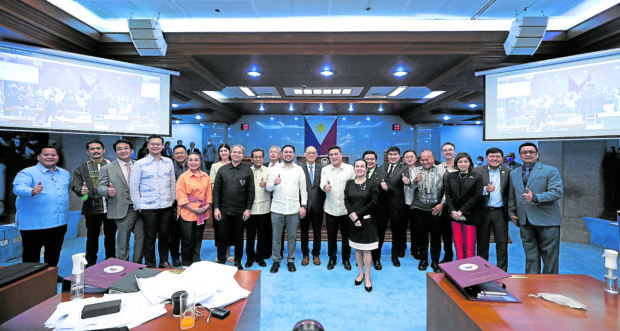
DONE IN JUST 6 MONTHS Senate President Juan Miguel Zubiri poses with other lawmakers and members of the economic team after the Senate’s marathon session in May that ended with the passage of Senate Bill No. 2020 creating the Maharlika Investment Fund. The bill, introduced in the House in November last year, is expected to be signed into law by President Ferdinand Marcos Jr. before his second State of the Nation Address on July 24. —SENATE PRIB
MANILA, Philippines — After securing the signature of Senate President Juan Miguel Zubiri, the Maharlika Investment Fund bill only awaits the approval of House Speaker Ferdinand Martin Romualdez before the contentious measure can be transmitted to Malacañang for the President’s approval.
But with this latest development in the Maharlika bill’s journey in Congress, a question remains: How were the conflicting provisions on the prescription period for crimes and offenses addressed?
The third reading copy of the Maharlika bill, as posted on the Senate website, has two provisions on the prescription period of crimes and offenses.
Section 50 sets the period for “crimes” at 10 years, while Section 51 sets the period for “offenses” at 20 years.
Senate Secretary Renato Bantug Jr. on Wednesday told reporters in a phone interview that this was addressed by merging the two sections, but essentially, keeping only the 10-year prescription period.
Even if the changes meant dropping the 20-year prescription period, Bantug said that Section 51 of the Maharlika bill was not deleted.
“For the economy of words, I lifted the section. Because right now, they’re separate. Prescription of crimes, and it ends there. The next section is on the prescription of offenses etcetera. So now, in combining it, the section title of the surviving section – Section 50 – is ‘prescription of crimes/offenses,’” he explained.
Bantug bared some details of Senator Mark Villar’s letter to Zubiri, which sought to clarify the double provisions.
Members of the media had repeatedly asked for a copy of this letter from the Maharlika bill sponsor’s office, but they have yet to receive the requested document.
“Senator Mark wrote to the Senate President, through me, and he said, it should be under one section — the two provisions,” Bantug said.
As reflected in the transcript of the proceedings, Bantug pointed out that 10 years was the firm position of the Villar-led sponsoring committee during the period of amendments in the Senate.
But, he reiterated, it does not mean Section 51 was deleted.
“So that’s classified as style because they’re just the same. The difference is, one is the prescription of crimes, and the other is the prescription of offenses. So, that’s what the Secretariat just did – ‘prescription of crimes/offenses,’” Bantug added.
Bantug brought the “corrected” Maharlika bill, as well as two other proposed measures, to Zubiri in the United States to secure his signature.
Zubiri, together with a Senate delegation, is currently in Washington, DC, on official business.
Bantug said they are now looking for a way to bring the Zubiri-signed Maharlika bill back to the country, so it can be sent to the House of Representatives for the signature of Speaker Ferdinand Martin Romualdez.
After this, he said, the Maharlika bill will be transmitted and enrolled to the Malacañang for President Ferdiand Marcos Jr.’s approval.
Over the past weeks, there have been heated debates on how Congress can fix the flaws in its approved Maharlika bill.
Several lawmakers sought to recall the measure back to Congress, so it can be discussed again on the floor and fixed according to the legislative process.
They cited Article 170 of the Revised Penal Code, which penalizes “any person who, without proper authority therefor alters any bill, resolution, or ordinance enacted or approved or pending approval by either House of the Legislature or any provincial board or municipal council.”
RELATED STORIES:
Maharlika bill moves forward, but still not sent for President’s approval
Congress OKs Maharlika bill without pensions as funding